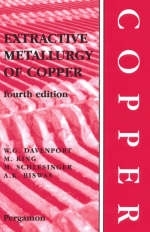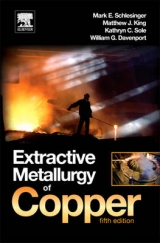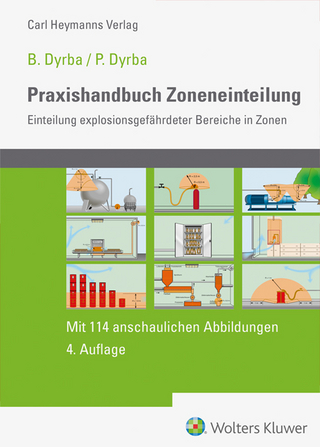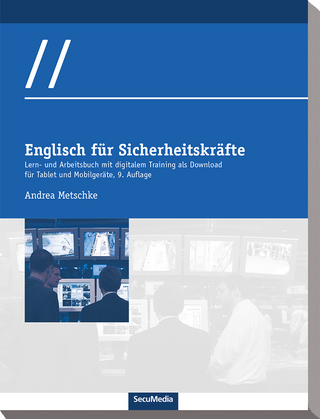
Extractive Metallurgy of Copper
Pergamon Press (Verlag)
978-0-08-044029-3 (ISBN)
- Titel erscheint in neuer Auflage
- Artikel merken
This new edition has been extensively revised and updated since the 3rd edition published in 1994. It contains an even greater depth of industrial information, focussing on how copper metal is extracted from ore and scrap, and how this extraction could be made more efficient.
Modern high intensity smelting processes are presented in detail, specifically flash, Contop, Isasmelt, Noranda, Teniente and direct-to-blister smelting. Considerable attention is paid to the control of SO2 emissions and manufacture of H2SO4. Recent developments in electrorefining, particularly stainless steel cathode technology are examined. Leaching, solvent extraction and electrowinning are evaluated together with their impact upon optimizing mineral resource utilization. The book demonstrates how recycling of copper and copper alloy scrap is an important source of copper and copper alloys. Copper quality control is also discussed and the book incorporates an important section on extraction economics.
Each chapter is followed by a summary of concepts previously described and offers suggested further reading and references.
Professor William George Davenport is a graduate of the University of British Columbia and the Royal School of Mines, London. Prior to his academic career he worked with the Linde Division of Union Carbide in Tonawanda, New York. He spent a combined 43 years of teaching at McGill University and the University of Arizona. His Union Carbide days are recounted in the book Iron Blast Furnace, Analysis, Control and Optimization (English, Chinese, Japanese, Russian and Spanish editions). During the early years of his academic career he spent his summers working in many of Noranda Mines Company’s metallurgical plants, which led quickly to the book Extractive Metallurgy of Copper. This book has gone into five English language editions (with several printings) and Chinese, Farsi and Spanish language editions. He also had the good fortune to work in Phelps Dodge’s Playas flash smelter soon after coming to the University of Arizona. This experience contributed to the book Flash Smelting, with two English language editions and a Russian language edition and eventually to the book Sulfuric Acid Manufacture (2006), 2nd edition 2013. In 2013 co-authored Extractive Metallurgy of Nickel, Cobalt and Platinum Group Metals, which took him to all the continents except Antarctica. He and four co-authors are just finishing up the book Rare Earths: Science, Technology, Production and Use, which has taken him around the United States, Canada and France, visiting rare earth mines, smelters, manufacturing plants, laboratories and recycling facilities. Professor Davenport’s teaching has centered on ferrous and non-ferrous extractive metallurgy. He has visited (and continues to visit) about 10 metallurgical plants per year around the world to determine the relationships between theory and industrial practice. He has also taught plant design and economics throughout his career and has found this aspect of his work particularly rewarding. The delight of his life at the university has, however, always been academic advising of students on a one-on-one basis. Professor Davenport is a Fellow (and life member) of the Canadian Institute of Mining, Metallurgy and Petroleum and a twenty-five year member of the (U.S.) Society of Mining, Metallurgy and Exploration. He is recipient of the CIM Alcan Award, the TMS Extractive Metallurgy Lecture Award, the AusIMM Sir George Fisher Award, the AIME Mineral Industry Education Award, the American Mining Hall of Fame Medal of Merit and the SME Milton E. Wadsworth award. In September 2014 he will be honored by the Conference of Metallurgists’ Bill Davenport Honorary Symposium in Vancouver, British Columbia (his home town). Matthew J. King has over 25 years experience in copper smelter operations and sulfuric acid plant projects. The first eight years of his career were spent in various operations roles at a copper smelter. During that period, he completed his PhD focused on control and optimisation of metallurgical sulphuric acid plants. His career since then has been based in Australia, focusing mainly on sulfuric acid plant design and operations with some work in copper smelting, off-gas handling and steam systems design. Matthew is a co-author of five technical monographs, including the latest editions of Elsevier titles Sulfuric Acid Manufacture and Extractive Metallurgy of Copper. Mark E. Schlesinger is a graduate of the University of Missouri–Rolla and the University of Arizona. He has spent a combined 31 years of teaching at The University of Utah and the Missouri University of Science and Technology. He is an author of: • Mass and Energy Balances in Materials Engineering • Extractive Metallurgy of Copper (4th and 5th English–language editions; Chinese edition) • Aluminum Recycling (two English language editions)Professor Schlesinger is a member of the (U.S.) Metals, Minerals, and Materials Society; the American Institute for Steel Technology; and the Society of Mining, Metallurgy and Exploration. He is a former Fulbright Scholar (Royal Institute of Technology (Sweden), 2002), and Leif Eriksson Fellow (Norwegian University of Science and Technology, 2012–13). He was named a Fellow of ASM International (2018).
Overview. Production and use. Concentrating copper ores. Matte smelting fundamentals. Flash smelting - outokumpu process. Inco flash smelting. Noranda and teniente smelting. Ausmelt/isasmelt matte smelting. Batch converting of Cu matte. Continuous converting. Copper loss in slag. Direct-to-copper flash smelting. Mitsubishi continuous smelting/converting. Capture and fixation of sulfur. Fire refining and casting of anodes: sulfur and oxygen removal. electrolytic refining. Hydrometallurgical copper extraction: introduction and leaching. Solvent extraction transfer of cu from leach solution to electrolyte. Electrowinning. Collection and processing of recycled copper. Chemical metallurgy of copper recycling. Melting and casting. Costs of copper production
| Erscheint lt. Verlag | 19.9.2002 |
|---|---|
| Verlagsort | London |
| Sprache | englisch |
| Gewicht | 750 g |
| Themenwelt | Technik |
| ISBN-10 | 0-08-044029-0 / 0080440290 |
| ISBN-13 | 978-0-08-044029-3 / 9780080440293 |
| Zustand | Neuware |
| Informationen gemäß Produktsicherheitsverordnung (GPSR) | |
| Haben Sie eine Frage zum Produkt? |
aus dem Bereich



